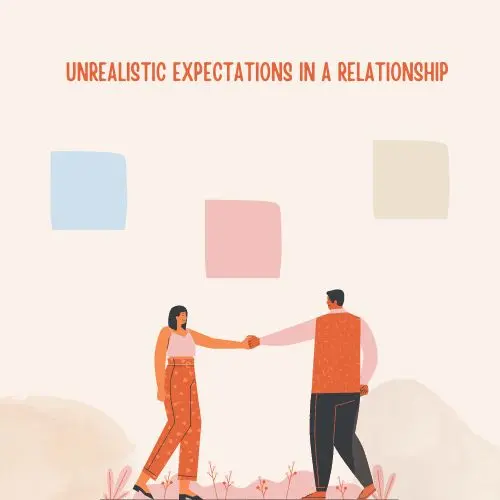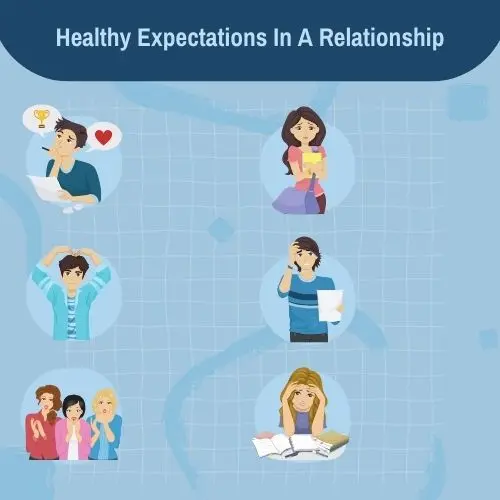Every new relationship comes with hopes for how it will develop. However, having demands or visions that are too fanciful can lead to issues later on. In this piece, I’ll discuss healthy versus unrealistic expectations and how to cultivate reasonable hopes to strengthen the bond steadily.
Unrealistic Expectations In A Relationship

Impractical expectations sometimes arise from idealized or flawless ideas of what a relationship ought to be, without acknowledging each person’s humanness. When someone starts something believing their partner must meet needs, solve problems, or complete them in ways no ordinary human realistically can, it sets up disappointment. Examples of unrealistic expectations include:
- Believing a partner will make you happy and complete you instead of taking responsibility for your fulfillment and well-being. No one person can meet all of another’s emotional needs.
- Thinking disagreements and arguments will never occur and assuming conflict-free bliss. All couples experience strain and tension at times due to differing views, bad moods, or external stressors.
- Imagining passion and honeymoon feelings will last forever instead of ebb and flow as relationships deepen. Intense attraction naturally fades over decades together as the focus shifts to companionship.
- Demanding constant communication, attention, and affection from a busy partner without allowing for personal time or independence. This neglects the fact people have lives outside of their partners.
- Presuming deep intimacy and vulnerability can happen instantaneously without putting in persistent nurturing work over the years. Close bonds take effort and compassion on an ongoing basis.
When hopes reach unrealistic proportions, it’s easy to feel let down by imperfect partner behavior that was never realistic to expect in the first place. This damages both people’s self-esteem and the relationship. The keys are managing idealistic visions, checking assumptions, and focusing on realistic potentials instead of fantasies.
Healthy Expectations In A Relationship

In contrast to unreasonable hopes, healthy relationship expectations acknowledge partners’ humanness while still striving for mutual care, respect, consideration, and growth. Some signs expectations are at a sensible level include:
- A partner as a complex person deserving privacy as well as support, with both strengths and weaknesses to work through together.
- Seeing a relationship as a long-term collaboration where each party brings value through their dedication rather than expecting one individual to “fulfill” the other.
- Welcoming disagreements as natural while committing to respectful conflict resolution to strengthen intimacy and bonds over dismissing tensions.
- Making time and effort for both togetherness and personal autonomy to recharge rather than demanding constant closeness is unsustainable.
- Understanding feelings fluctuate yet prioritizing consistent caring, loyalty, communication, and teamwork that sustains passion long-term.
- Viewing compromise, forgiveness, and personal growth as necessities instead of believing a perfect match requires no adjustment.
- Building daily acts of kindness, affection, cooperation, and fun slowly deepens intimacy far more than expecting it to form overnight.
Having reasonable hopes acknowledges relationships take maintenance work from both sides. The focus is on appreciation for a partner’s whole self and growing closer through cooperation versus expecting one person to meet every need. This fosters realistic yet nourishing relationships built to last.
When relationship expectations are too high

While some hopes show vision and motivation, having expectations placed too high sets a relationship up for strains it may not be able to withstand. Signs expectations exceed reality include:
- Becoming dissatisfied, resentful, or blaming a partner for not meeting every unrealistic demand instead of accepting imperfections.
- Showing little understanding or compromise when a partner’s priorities or personality differ slightly from what was planned rather than valuing them as individuals.
- Neglecting to appreciate the effort and caring demonstrated every day in favor of dwelling on slights or ways a person comes up short of fantasies.
- Relying entirely on the other for validation, purpose, and happiness instead of valuing their independence and identity outside the relationship.
- Assuming the happiness and needs of one automatically come before the others without making each other a priority equally.
- Failing to adjust hopes when major life changes occur and relationships naturally evolve instead of flexing with new phases.
- Unrealistic timelines that believe close intimacy forms in weeks rather than appreciating the slow trust-building of long partnerships.
When hopes dwarf reality, it makes it difficult for partners to feel genuinely appreciated for who they are rather than for fulfilling unrealistic visions. Meeting expectations that were never feasible sets someone up for burnout trying to please another. The healthiest approach acknowledges both people’s humanity and works as a team to nurture care, understanding, and compromise.
Maintaining realistic expectations requires checking one’s perspectives for idealized beliefs that don’t match real-world romance. Maturity in love comes from valuing each partner for themselves while seeking to understand the other’s heart authentically through open communication. With care, insight and cooperation, relationships can then deepen in sustainable ways both find nourishing.
Conclusion
In summary, all people in love have hopes for how a bond unfolds. While some visions motivate couples to grow together, expectations placed too high set a different course for strain. The balance comes from recognizing another’s imperfect self, seeing a relationship as a collaboration, adjusting to life’s changes, and prioritizing teamwork, care, and compromise over perfection. With realistic yet caring expectations, partners support each other rather than dissatisfy through fantasies and find relationships that nurture them both for life.

